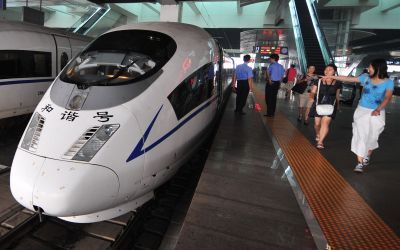World’s largest high-speed rail system set to seduce China’s commuters

The Chinese Government's grand plans to link the entire nation by high-speed electric train are steaming ahead, with 2012 now set as the date when the system will overtake Europe's as the world largest.
That's great news for commuters but might well spell tough times ahead for China's domestic airlines, who will be forced to go head-to-head with the train system for both the local and tourist dollar.
At the moment, it costs on average 1,258 yuan (€123) for a one-way economy-class air ticket between Beijing and Shanghai. When the fast-rail line between China's two major cities opens in 2012, a one-way ticket on that service is expected to cost just 500 yuan (€49).
China's rail service has developed at a remarkable rate over the past few years.
In 2007, there were 1,109 kilometers of high-speed rail lines in the country, by 2012 there will be 13,000 kilometers linking most of the country's major cities, according to figures being trumpeted by China's railways ministry.
In 2007, there were 105 fast-speed trains in service, by 2012 there will be 800, they say.
Europe currently has around 6,400 kilometers of high-speed lines, according to rail industry consultants Frost and Sullivan.
As well as being environmental and economically attractive - to those using the system, not those footing the estimated US$300 billion (€201 billion) construction bill - the high-speed train system is designed to give an attractive option in terms of commuting times between China's major cities.
China's trains - which will be able to reach more than 300km/h - will take you from Beijing to Shanghai in four hours flat, it is being claimed. The flight currently takes fours hours and 15 minutes.
And the Chinese Government is pointing to Europe as an example of what this means to travelers. Put simply, the shorter the travel time, they say, the more passengers there will be wanting to use the service.
An example quoted was the Paris-Marseille route which saw the market share taken by trains improve from 22 to 85 percent over air travel once the high-speed rail system was introduced, according to the Agence Francaise de Developpement, a financial development arm of the French government.
MS
Join our commenting forum
Join thought-provoking conversations, follow other Independent readers and see their replies
Comments